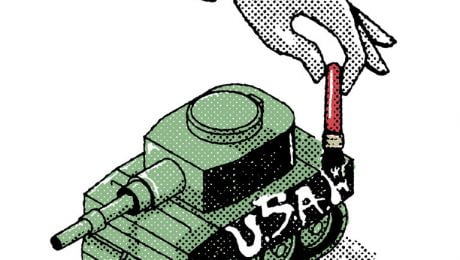Keyword: Military coups in Turkey

Fethullah Gülen’s lawyers fear attacks on his life amid calls for return to Turkey
“We’re very concerned about his safety,” said Reid Weingarten, a member of Gülen’s legal team, at a press conference on Friday in Washington DC. Weingartern repeated Gülen’s denials that he was involved in the attempted coup attempt and suggested that the Turkish government’s evidence will fall far short of American legal standards. “For Mr Gülen to be involved, he would have to be acting inconsistent with everything he’s done his entire adult life,” he said.

U.S. Not Persuaded to Extradite Fethullah Gulen Over Turkey Coup
Officials aren’t convinced by evidence against Fethullah Gulen, Pennsylvania-based imam who Turkey says masterminded the failed putsch. U.S. officials don’t expect to extradite an imam Turkey blames for masterminding a failed coup because they aren’t convinced by the evidence Ankara has presented so far and are troubled by threatening public statements from Turkish officials, according to people familiar with the discussions.

Commentary: Abuses rampant in wake of Turkish coup
We don’t know a lot. But what we do know should cause us to ask our elected officials to look carefully at any request for extradition for Fethullah Gulen. We don’t know everything, but we know that the post-coup crackdown has included public appeals “to be protected from the evil things of educated people.” Nearly 60,000 have been detained. Some 1,600 university academic deans have been relieved of their positions.

Gulen: Issuance of arrest warrant changes nothing about my views
The issuance of an arrest warrant from a Turkish court changes nothing about my status or my views. I have repeatedly condemned the coup attempt in Turkey and denied any knowledge or involvement. It is well-documented the Turkish court system is without judicial independence, so this warrant is yet another example of President Erdogan’s drive authoritarianism and away from democracy.

Religious freedom threatened by Turkey’s response to coup
From his self-imposed exile in Pennsylvania, Gulen has disavowed any association with the coup attempt. “My philosophy — inclusive and pluralist Islam, dedicated to service to human beings from every faith — is antithetical to armed rebellion,” Gulen wrote for The New York Times.

How It Feels to Be a Dissident in Turkey After the Failed Military Coup
LOUISE CALLAGHAN To plan a speedy political exile from Turkey today, you need two things: a world map and the Wikipedia page on “visa entry requirements for Turkish citizens.” If you get out a highlighter and start cross-referencing the two, you’ll quickly see the bottom half of the map is more accessible than the top. […]

Turkey’s Crackdown Extends to Taipei
Burhan Cikili is an academic and vice-chair of the Formosa institute. The organization, which has a plush office on the 21st floor of a central Taipei office building, is something of a local think-tank linking Taiwan and Turkey. It holds conferences, seminars and lectures, and collaborates with local universities and institutions. It says it is mainly funded by local Taiwanese and Turkish businesspeople.

Turkey’s New Anti-Americanism (NY Times Editorial)
The Turks need to be reminded that Mr. Gulen has a legal right to be in the United States, and that the Justice Department would have to go through a rigorous process before deciding whether he could be handed over, especially to a country where due process is increasingly unlikely and torture is reportedly used against detainees.

Islamabad High Court moved against expected closure of Turkish schools
The Islamabad High Court yesterday issued notices to ministries of foreign affairs and interior in a petition moved against any possible step of the government to close down the schools being run by Pak-Turk Education Foundation.

Pak-Turk schools issue: Foundation moves court for fear of closure
The Islamabad High Court (IHC) directed the deputy attorney general to seek instructions from the Ministry of Interior and the Ministry of Foreign Affairs after Pak-Turk Education Foundation moved the IHC against the possible closure of the network by the government, on Wednesday.

Minister says Pak-Turk schools won’t be closed down
Karachi—Sindh Education minister Jam Mehtab Dhahar has assured a Turkish team Tuesday that Pak-Turkish schools will not be closed down in Sindh or anywhere in Pakistan. They gave the assurance to the visiting Turkish team during meeting in Karachi, with the Turkish officials, here on a tour.

Turkey: Detained higher education professionals at risk of torture
Scholars at Risk (SAR) is gravely concerned about sweeping actions against Turkey’s higher education sector, including most recently prolonged incommunicado detention and related risks of torture and ill-treatment of hundreds of higher education professionals, in violation of Turkey’s obligations under domestic and international law.

Free speech groups condemn Turkey’s closure of 29 publishers after failed coup
Jo Glanville, director of English PEN, said: “The coup posed a serious threat to the Turkish state, but the closing down of publishers, alongside the mass sackings, detentions, arrests and allegations of torture, will have a grave impact on democracy. The crackdown on freedom of expression was already a continuing concern. The coup now appears to be an opportunity for Erdoğan to purge Turkey of his opponents.

Sweden delays sending back Erdogan dissenters
Asylum seekers with ties to the opposition from last month’s failed coup attempt in Turkey will not be sent back to the nation by Sweden until further notice, the Swedish Migration Agency has decided. People who have taken part in “credible political opposition” are also part of the risk group, the Migration Agency writes on its website.


















